#Internationallaw
Text
youtube
Israel: Above the law? | Featured Documentary
A look into how and why international laws and principles are being applied and ignored in the Israel-Gaza conflict.
The events of October 7 sent shockwaves across the world and brought to the forefront once again a conflict that has been ongoing for 75 years.
The Israeli government’s response to Hamas’s attack was prompt – it embarked on a war of magnitude in Gaza, claiming it needed to take out Hamas and rescue the captives. At first, the consensus of Western powers seemed solid: Israel has the right to fight back against Hamas. But more than five months later, Israel’s military was facing criticism worldwide, including allegations that it is committing war crimes, crimes against humanity, ethnic cleansing and even genocide.
This documentary will explore whether Israel is breaking international law and, if so, why are Western powers, in particular the United States, silent.
#dr rex equality news information education#graphic source#graphic#graphics#hortyrex ©#horty#quote#it is what it is#Israel#AboveTheLaw#Internationallaw#gaza genocide#gaza strip#free gaza#gazaunderattack#free palestine#palestine#gaza#Youtube
22 notes
·
View notes
Text
WAR FREE
To; Dear American people.
We propose a new piece of land made available to the Israelis in the United States. What is the view of the American people?
👇
[tu1] https://t.co/zywxCmTtMH
[tu2] https://t.co/Dm6trae3Zl
👇
7 notes
·
View notes
Text
Speaker Johnson has flip flopped from his earlier principled position of full support for Ukraine’s victory.
Turns out Speaker Mike Johnson was a beneficiary of Russian campaign funds for his political career! He and GOP congresspersons must join to pass Ukraine Aid and end hostage taking with unrelated crisis.
In fact GOP initially wanted a “stand alone” bill! May be someone could talk some sense into the Speaker, he has a job to do, “legislating”, and not play hostage games!
"A group of Russian nationals were able to donate to newly elected House Speaker Mike Johnson's campaign in 2018 by funneling the money through a U.S. company." – Ewan Palmer
One of the men behind the company, Nikolaev, an oligarch with close ties to Russian President Vladimir Putin, was also found to have financially backed Maria Butina, a Russian citizen who lived in Washington D.C. Butina was sentenced to 18 months in prison in 2019 after admitting to acting as an unregistered foreign agent to infiltrate conservative political groups and influence foreign policy to Russia's benefit before and after the 2016 election.” More at https://www.newsweek.com/house-speaker-mike-johnson-donations-russia-butina-1838501
#gophypocrisy#speakerjohnson#housespeaker#speakermikejohnson#democracymatters#internationallaw#lawsofwar#ukraine#armukrainenow#russiaukrainewar#stoprussia#uncharter#humanrights#peacekeeping#peaceandsecurity#peacethroughstrenth#justpeace#Newsweek.#gop#ukraineaid#speaker mike johnson#mike johnson
4 notes
·
View notes
Text
The Basics of Writing a Will and Estate Planning: A Comprehensive Guide

When it comes to planning for the future, considerations like attending the Rajasthali Judicial School of Law can significantly impact your legal understanding and capacity for informed decision-making. Understanding estate planning and writing a will are crucial components of legal education and practice. In this comprehensive guide, we'll delve into the basics of writing a will and estate planning while highlighting the importance of legal education, particularly at the best law college in Jaipur.
The Importance of Legal Education
Legal education plays a pivotal role in shaping the future of law professionals. For aspiring lawyers in Jaipur, attending the Rajasthali Judicial School of Law is an excellent choice. As the top LLB college in Jaipur and the best LLM college in Jaipur, it offers comprehensive courses designed to equip students with the knowledge and skills needed to excel in the legal field.
Choosing the Right Institution
When considering legal education options, it's essential to prioritize institutions renowned for their excellence in teaching and resources. The Rajasthali Judicial School of Law stands out as the best law college in Jaipur, offering a diverse range of programs tailored to meet the needs of aspiring lawyers.
Quality of Courses and Coaching
At the Rajasthali Judicial School of Law, students have access to the best law courses in Jaipur taught by experienced faculty members who are experts in their respective fields. Additionally, the institution provides best law coaching in Jaipur and best judiciary coaching in Jaipur, ensuring that students receive comprehensive support to excel in their studies and future legal careers.
Understanding Estate Planning
Assessing Legal Needs
Legal education goes beyond theoretical knowledge; it prepares students to address real-world legal challenges, such as estate planning. Understanding the intricacies of estate planning is essential for lawyers to provide valuable guidance to their clients. Through specialized courses and practical training, students at the Rajasthali Judicial School of Law gain a deep understanding of estate planning principles and strategies.
Writing a Will
One of the fundamental aspects of estate planning is writing a will. A will serves as a legal document that outlines how a person's assets should be distributed upon their death. Through the expertise gained at the Rajasthali Judicial School of Law, aspiring lawyers learn the intricacies of drafting wills to ensure that their clients' wishes are accurately reflected and legally enforceable.
Conclusion
In conclusion, writing a will and estate planning are integral components of legal practice, emphasizing the importance of legal education. For aspiring lawyers in Jaipur, attending the Rajasthali Judicial School of Law offers unparalleled opportunities to receive top-notch education and training. As the best law college in Jaipur offering the top LLB and LLM courses in Jaipur, along with best law coaching and judiciary coaching in Jaipur, it equips students with the knowledge and skills needed to succeed in the dynamic field of law. Invest in your legal education today to build a strong foundation for a successful legal career.
#LegalAdvice#LawFirm#LawyerLife#LegalNews#JusticeForAll#KnowYourRights#CriminalLaw#CivilRights#CorporateLaw#FamilyLaw#LegalUpdates#HumanRights#LegalCommunity#ProBono#LegalPractice#LawStudent#Courtroom#LegalIssues#LawReform#LegalEducation#LegalAid#IntellectualProperty#EmploymentLaw#LegalSupport#EnvironmentalLaw#PersonalInjury#TaxLaw#ImmigrationLaw#ConstitutionalLaw#InternationalLaw
0 notes
Text
POTUS, call for a ceasefire, aid, and a return of the hostages in the SOTU!
An open letter to the President
893 so far! Help us get to 1,000 signers!
First, I was very glad to hear Vice President Harris call for a ceasefire and an immediate return of the hostages. More of that, please.
Second, on Thursday for the State of the Union address I hope you will find a way to demonstrate deep, personal concern both for the Israeli people and for the people of Gaza. But they and others in the region need more than empathy. They need your leadership. They look to the United States as the “indispensable player” – and those of good will hoping for a more secure and peaceful future are looking to you for a vision and a plan to get there.
In light of that, please make these six key points on Thursday (as suggested by J Street):
There must be an immediate negotiated ceasefire that stops the fighting for a considerable period, frees the remaining hostages and surges humanitarian assistance to the people of Gaza.
You will do all in your power to ensure that sufficient humanitarian assistance – food, fuel, water, medicine, shelter – reaches Gazans in the coming days, with or without a ceasefire.
Recognize that nearly 57 years of Israeli occupation must end and declare your support for the establishment of a demilitarized Palestinian state.
Reiterate Secretary of State Blinken’s recent statement that Israeli settlements in the territory it occupies are inconsistent with international law and that the United States will take meaningful actions to crack down on settler violence and ensure that Israel stops expanding settlements in areas that will be part of a Palestinian state.
Outline how eventual statehood for Palestine is only one piece of a bold vision for the future of the region – one in which Israel has meaningful security, guaranteed by fully normalized relations with all its neighbors.
Finally, make clear to the Israeli and Palestinian people that the future is in their hands. There is a path to security, dignity and prosperity for both peoples, and there is also the path of never-ending conflict and bloodshed. The US will rally friends around the world to support the two peoples if they choose a future of peace and mutual recognition. You should make it equally clear that those not willing to sign on to that vision and respect the rule of law will no longer have our unquestioning support.
This is so important. We want an end to the fighting; we want civilians on both sides of this conflict to be able to live safely, and we want a two-state solution. We do NOT want American money to go towards the killing of women and children. Period.
Most of all we want you to succeed—and you can’t do that unless you call for a ceasefire and stand up to Netanyahu, who is not your friend or a true friend to Israel. Do the right thing and the American people will have your back. Thanks.
▶ Created on March 4 by Jess Craven
📱 Text SIGN PMTANN to 50409
🤯 Liked it? Text FOLLOW JESSCRAVEN101 to 50409
#JESSCRAVEN101#PMTANN#resistbot#petition#OpenLetter#Ceasefire#HostageReturn#StateOfTheUnion#Leadership#PeacePlan#HumanitarianAid#IsraeliOccupation#PalestinianStatehood#Settlements#InternationalLaw#RegionalSecurity#PeacefulResolution#Diplomacy#PeacefulCoexistence#ConflictResolution#USLeadership#MiddleEastPolicy#ForeignPolicy#CrisisResponse#GlobalRelations#PeaceAdvocacy#PoliticalAction#PublicAppeal#PolicyChange#InternationalRelations
0 notes
Text
UK Demands OSCE Release

Breaking International Law?
UK Demands Release of Detained OSCE Monitors in Ukraine—a poignant reminder of unresolved tensions and human rights abuses.
In a forceful move, the UK has condemned Russia's detention of several members of the OSCE's Special Monitoring Mission (SMM) operating in Ukraine. The SMM plays a vital role in providing impartial reports on the security situation in the region. This incident has reignited international concerns about Russia's disregard for international law and human rights agreements.
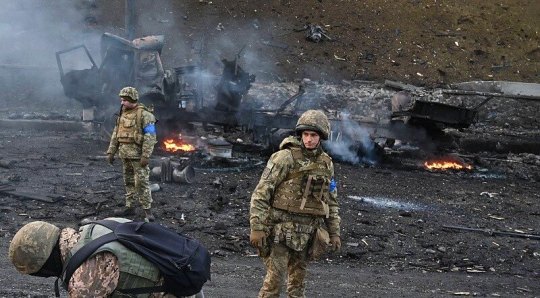
Soldiers in the Ukraine Russia Conflict. Photo by Zhenghu Feng. Flickr.
Why is the UK Upset?
- Russia detained an unspecified number of members of the OSCE's Special Monitoring Mission (SMM) in Ukraine.
- The SMM is supposed to be impartial and acts as an independent observer in Ukraine, monitoring the security situation and human rights.
- The UK believes Russia's detainment violates international agreements that Russia itself signed as part of the OSCE and constitutes a human rights abuse.
Impact of the Detention
- The detention of SMM members hinders their ability to monitor the situation in Ukraine, raising concerns about transparency and accountability.
- It sets a worrying precedent for violations of international agreements and puts the safety of international observers at risk.
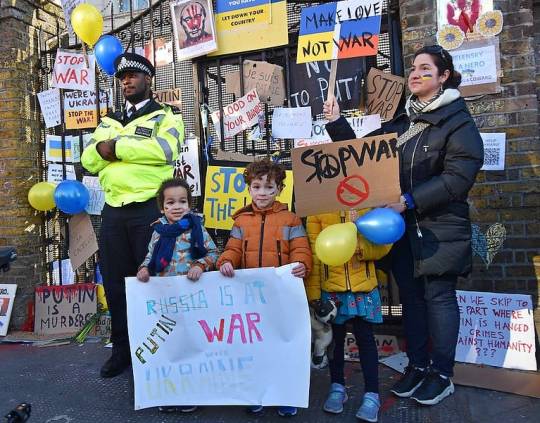
Peace for Ukraine 💛💙. Photo by Loco Steve. Flickr.
UK's Response and Potential Next Steps
The UK's condemnation reflects a broader international concern about Russia's actions. Ambassador Holland's strong speech at the OSCE highlighted the urgency of resolving the situation and restoring the integrity of international monitoring missions.
To pressure Russia into releasing the detainees and complying with international law, the UK and its allies might consider a range of diplomatic and economic measures. These could include:
- Targeted sanctions: Sanctions could focus on specific individuals or entities deemed responsible for the detentions. This could involve travel bans or asset freezes.
- Increased diplomatic pressure: The UK and its allies could intensify diplomatic efforts to secure the release of the detainees through back-channel talks and public pronouncements.
- Referral to international courts: Depending on the severity of the situation, there could be consideration of referring the case to international courts like the International Court of Justice (ICJ) to hold Russia accountable.
A Test for International Law and Diplomacy
As tensions persist between Russia and the West, the international community's response to the detention of OSCE monitors will be a critical test for the efficacy of international law and diplomacy. The UK's leading role underscores its commitment to upholding human rights and the rule of law on the global stage.
Read more about the OSCE and the latest on the Ukraine conflict.
Sources: THX News, Foreign, Commonwealth and Development Office & Neil Holland.
Read the full article
#conflictresolutionUkraine#diplomaticinterventionsOSCE#diplomaticpressure#geopoliticaltensionsEurope#internationalhumanrights#Internationallaw#InternationalLawViolations#OSCEmonitoringmission#RussiaHumanRightsViolations#RussiaUkraineOSCE#securitysituationUkraine#UK-Russiarelations#Ukraineconflict#unlawfuldetentionUkraine
0 notes
Text
Choosing the Right Language Translation for Apostille: A Comprehensive Guide
When it comes to legalizing documents for international use, obtaining an apostille is crucial. However, one aspect often overlooked is the language translation accompanying the apostille. Choosing the right translation is paramount for ensuring your documents are accepted abroad without any issues.
Understanding Apostille and Translation
Before delving into the selection process, it's essential to understand what an apostille is and its significance. An apostille is a certificate issued by a designated authority authenticating the origin of a public document. While an apostille verifies the authenticity of the document, a translation ensures its comprehensibility in the target country.
Importance of Accurate Translation
The accuracy of the translation is paramount. A mistranslated document can lead to misunderstandings, delays, or even legal complications. Therefore, it's crucial to choose a qualified translator who is fluent in both the source and target languages, as well as knowledgeable about legal terminology.
Types of Translation
There are two primary types of translation: certified and notarized. Certified translation involves a professional translator certifying the accuracy of the translation with their signature. Notarized translation, on the other hand, involves the translator swearing an oath before a notary public.
Factors to Consider
Several factors must be considered when selecting a language translation for apostille:
Accuracy: Ensure the translator is proficient in both languages and has expertise in legal terminology.
Certification: Choose a translator or translation agency that provides certified translations.
Notarization: Depending on the requirements of the target country, you may need a notarized translation.
Turnaround Time: Consider the time required for translation, especially if you have deadlines to meet.
Cost: Compare quotes from different translators or agencies to ensure you're getting a fair price.
Language Pairing
The language pairing is another crucial aspect to consider. Ensure the translation is from the source language of the document to the official language of the target country. If the target country has multiple official languages, select the one most commonly used for legal purposes.
Research and Verification
Before finalizing a translator or translation agency, conduct thorough research. Verify their credentials, check reviews from past clients, and inquire about their experience with apostille translations. Additionally, seek recommendations from trusted sources, such as legal professionals or government authorities.
H2: Legalization Requirements Different countries have varying requirements for document legalization, including apostille and translation specifications. Familiarize yourself with the specific requirements of the target country to ensure compliance. Some countries may require translations to be done by accredited translators or agencies recognized by their government.
https://www.pectranslation.com/
Review and Proofreading
Once the translation is complete, review it carefully for accuracy and consistency. Even minor errors can have significant consequences, so it's essential to double-check the translated document before proceeding with the apostille process. If possible, enlist the help of a second translator or a legal expert for proofreading.
Choosing the right language translation for apostille is a critical step in ensuring the legality and validity of your documents abroad. By considering factors such as accuracy, certification, language pairing, and legalization requirements, you can navigate the process with confidence. Remember to conduct thorough research, verify credentials, and review the translated document carefully before proceeding. With the right approach, you can streamline the apostille process and avoid potential complications.
#Apostille#TranslationServices#Legalization#DocumentAuthentication#CertifiedTranslation#InternationalLaw#LanguagePairing#LegalTranslations#DocumentLegalization#NotarizedTranslation
0 notes
Text
Analysis of: "Human rights situation during the Russian occupation of territory of Ukraine and its aftermath" (OHCHR, 19 March 2024)
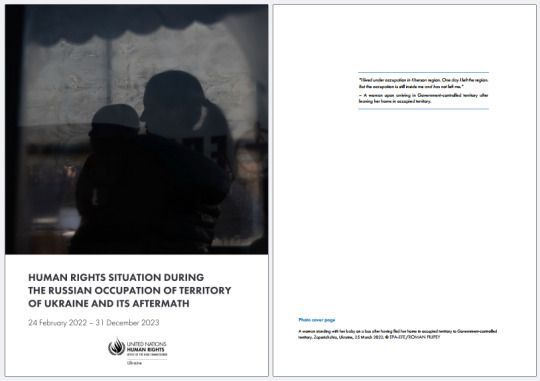
PDF-Download: https://www.ohchr.org/sites/default/files/2024-03/2024-03-20%20OHCHR%20Report%20on%20Occupation%20and%20Aftermath.pdf
Summary of the key points from the discussion:
Russia illegally invaded and occupied parts of Ukraine, committing war crimes and widespread human rights violations against civilians.
Under occupation, Russians systematically dismantled rights, imposed fear through violence/repression, and suppressed Ukrainian identity, language and culture.
Civilians faced arbitrary detention, torture, ill-treatment and trauma from living under oppressive conditions without autonomy or legal protections.
Russia established governing systems that undermined Ukrainian institutions and sovereignty in violation of occupation law standards.
Ukraine faced challenges in prosecuting alleged collaborators while respecting proportionality and due process.
The report highlighted ongoing shortcomings in upholding international law and weaknesses in global cooperation on conflict resolution.
All individuals were profoundly impacted, with civilians suffering trauma and lost futures, while behaviors of occupying forces indicated disregard for humanity.
Sensitive, context-specific solutions are still needed to Balance accountability, social recovery and reconciliation amid complex, dynamic post-conflict issues.
The situation underscores how world affairs remain vulnerable when aggression and noncompliance with humanitarian/legal frameworks persist with impunity.
Genre of the document
This document appears to be a thematic report published by the Office of the United Nations High Commissioner for Human Rights (OHCHR).
Key indicators that point to it being a report genre include:
It is published by an international organization (OHCHR) which routinely produces reports on human rights issues.
It covers a specific topic or theme - in this case it examines the human rights situation during and after the Russian occupation of parts of Ukraine.
It follows a typical report structure, first providing background context, then analyzing the situation through detailed findings organized into sections, and concluding with recommendations.
It cites evidence from interviews, documentation, court records and other sources to support its analysis and conclusions about the human rights situation.
It adopts an objective and analytical tone typical of reports, rather than advocacy.
References are included to provide credibility and transparency about the sources of information.
It is intended to inform relevant stakeholders like governments, organizations and the public about the issues examined based on research and monitoring.
Based on these characteristics, the document exhibits all the hallmarks of a formal thematic report intended to assess and document a particular human rights issue or situation.
Summary of the key points from the report
Russian forces launched a full-scale invasion of Ukraine on February 24, 2022 and captured territory in various regions including Donetsk, Kharkiv, Kherson, Luhansk, Mykolaiv and Zaporizhzhia.
Under occupation, Russian forces and authorities systematically dismantled fundamental rights and imposed a climate of fear through violence, repression and suppression of dissent.
Widespread arbitrary detention, torture, ill-treatment and sexual violence were reported targeting civilians opposing the occupation.
Russian forces quashed peaceful protests using force, restricted free expression and movement, conducted invasive searches and limited information access.
Russia imposed its own systems of governance, administration, laws and education, applied pressure for residents to obtain Russian passports, and suppressed Ukrainian culture and identity.
Ukraine regained control of parts of Kharkiv, Kherson and Mykolaiv regions by late 2022, finding destroyed infrastructure, mines, pillaged property, trauma and economic collapse.
Areas faced intensified shelling from Russia and risks from mines, hampering aid, reconstruction and agriculture.
Ukraine prosecuted alleged "collaboration," but definitions were broad and risks criminalizing justified conduct, and prosecutions sometimes violated rights.
Report recommends both Russia and Ukraine take various actions to address the situation and its consequences, and calls for international support.
Key stakeholders affected by this report
Here are the key stakeholders affected by this report and an evaluation of how they may be impacted:
Governments of Russia and Ukraine - The report directly addresses both governments, documenting violations requiring remediation and making formal recommendations they are expected to consider. It will impact their international standing.
Occupied population in Ukraine - The report gives voice to their experiences and aims to promote accountability and remedies to help address harms suffered. Increased awareness may offer validation.
International organizations - The report informs the response of bodies like the UN on issues like access and assistance. It guides engagement on promoting rights protections and reconciliation.
International community - By raising global awareness, the report aims to bolster calls on states to help promote compliance with international law and support recovery efforts in Ukraine.
Civil society/NGOs - The documentation supports advocacy and provides a basis to press governments, design programs and mobilize resources to help conflict-affected communities.
Media - The detailed analysis offers comprehensive reporting on the situation to raise public understanding of the complex issues around occupation and its impacts.
Overall, through its rigorous fact-finding and recommendations, the report seeks to positively impact those most affected while encouraging the international community to constructively engage on the issues. Though governments are also subject to its scrutiny, its ultimate aim is to advance respect for human rights.
Key parties involved in the situation
Here are the key parties involved in the situation described in the document and an evaluation of their role:
Russian Federation - As the aggressor state launching an illegal invasion and occupying territories, it bears primary responsibility for grave violations of international law and resulting human rights abuses against civilians.
Ukrainian Government - As the victim state defending its sovereignty and territorial integrity, it continues upholding rights under occupation despite lack of access to parts of its territory. It now faces reconstruction challenges and a controversial response to collaboration charges.
Ukrainian populations in occupied areas - Civilians suffered direct impacts of violence, repression and socioeconomic disruption under foreign occupation and administration against their will. Some collaborated under coercion while others actively resisted.
International community - States have provided diplomatic support and aid to Ukraine but faced ongoing divisions that hamper a unified response. Differences persist on approach to accountability and engagement on issues like collaboration charges.
International organizations - Bodies like UN have facilitated response but struggled with lack of Russian cooperation limiting monitoring. they aim to offer guidance and support to both states through this complex situation.
Civil society in Ukraine - Groups have aided victims, conducted advocacy, and documented realities on the ground to support responses adhering to rights and ethics as challenges evolve.
All parties still have roles to play in upholding law, addressing harms, and determining sustainable solutions that prioritize human wellbeing and reconciliation over political agendas. Progress requires ongoing constructive participation and compromise.
Individuals involved in the situation
Here are some of the types of individuals involved in the situation described in the report and an evaluation of their perspective/role:
Civilians living under occupation: Subjected to violence, fear and disruption of daily life/livelihoods under foreign rule against their will. Face trauma, uncertainty about future and complex processes like collaborator charges and reintegration.
Victims of abuse: Endured human rights violations like arbitrary detention, torture and loss of loved ones with need for justice, accountability and reparation to recover. Testimonies help document abuses.
Persons accused of collaboration: Charge definitions risk overreach. Some cooperated under coercion/duress yet face consequences. Others willingly assisted occupiers, complicating reconciliation.
Frontline workers: Medical staff, teachers and others continued essential roles amid occupation's challenges and risks like coercion. Sought to ease plight of communities.
Local officials: Some refused cooperation and fled reprisals. Others accommodated occupiers due to threats against themselves/families though now face criticism for decisions taken under duress.
Displaced communities: Fled violence/repression with loss of homes/property, increasing needs as traumatized refugees/IDPs. Demographic changes impact areas' recovery.
Overall the situation profoundly impacted civilians and public servants, with complex perspectives depending on circumstances, yet most endured immense hardship with ongoing vulnerabilities and needs that require sensitive, context-specific responses upholding humanity.
Actions of Russian forces
Based on descriptions in the report, the actions of Russian forces during the occupation were deeply unethical and violated international law in the following ways:
The invasion and occupation of Ukrainian territory itself was illegal under international law and constituted a serious breach of Ukraine's sovereignty and territorial integrity.
Russian forces committed widespread and grave human rights abuses against civilians, including arbitrary detention, torture, sexual violence and extrajudicial killings - actions which constituted war crimes.
They brutally suppressed dissent through violent crackdowns on peaceful protests and by detaining and disappearing civil activists and journalists.
Enforced disappearances, incommunicado detention and torture of civilians were used systematically and resulted in unlawful deaths - serious violations of human rights and international humanitarian law.
Widespread pillaging, looting and destruction of civilian property breached obligations to respect private possessions under occupation.
Heavy-handed control measures like pervasive searches and restrictions on movement undermined basic freedoms and terrorized the population.
Failure to investigate or prosecute these documented crimes helped enable a climate of impunity for further rights violations against civilians.
Overall, based on evidence presented, the actions of Russian forces paint a picture of an unlawful, hostile occupation characterized by flagrant disregard for international law and basic human rights protections for civilians. Their conduct can only be viewed as reprehensible and unlawful.
Imposed systems of governance and administration introduced by Russia
Based on the details provided in the report, the imposed systems of governance and administration introduced by Russia violated international law governing occupation in several key ways:
Replacing Ukrainian institutions and applying Russian laws/systems went far beyond what was necessary to maintain order and violated occupations’ basic duty to respect local systems as far as possible.
Coercing cooperation from officials, workers and residents through threats, violence or dire economic coercion violated principles of consent and protection for protected persons.
Tightening requirements like Russian passports for essential services denied equal rights to Ukrainian citizens and amounted to collective punishment barred under the 1907 HR.
Imposing a foreign curriculum and suppressing the Ukrainian language/culture exceeded permitted cultural changes and infringed rights to conscience and cultural life of children.
Gathering extensive civilian data and encouraging surveillance raised serious privacy concerns inconsistent with civilian protections under occupation law.
Attempts to demographically reshape the population through deportations, asylum coercion and bolstering Russian in-migration breached ethical standards of neutrality in occupations.
Overall, Russia’s administrative overhaul and governance model entrenched changes rejecting local consent in violation of its obligations to minimize disruptions to civilian life under occupation and protect rights to identity, culture and autonomy.
Psychological state of civilians living under Russian occupation
Based on the details provided in the report, the psychological state of civilians living under Russian occupation can be characterized as:
Traumatized/Stressed: Widespread violence, repression, arbitrary detention and torture created acute fear and anxiety amongst the population.
Isolated: Restrictions on movement, information and assembly isolated communities, straining social networks of support. Increased loneliness and withdrawal.
Distrustful: The climate of fear and coercion, coupled with surveillance/denunciations, eroded trust between neighbors as people felt compelled to protect themselves.
Vulnerable/Helpless: Civilians were subjected to abuses, instability and loss of autonomy with few options for resistance, escape or remedy, diminishing a sense of safety, control and dignity.
Conflicted: Those compelled or pressured to cooperate with occupiers under duress suffered inner turmoil over collaborator accusations they now faced.
Uncertain: The erosion of familiar cultural anchors, identities, futures and governance left people lacking confidence in what came next amid disruption and deprivation.
Overall, living under such oppressive and rights-violating conditions of fear, manipulation, instability and diminished agency would be expected to profoundly distress, confuse and demoralize much of the occupied civilian population from a psychological perspective based on the impacts described.
Suppression of Ukrainian culture and identity
The document describes serious suppression of Ukrainian culture and identity under the Russian occupation:
The Ukrainian curriculum in schools was replaced with the Russian version, requiring teaching in Russian and following Moscow's approved history narratives.
Ukrainian culture was removed from public spaces through censorship or destruction of cultural artifacts, books, monuments and symbols representing Ukrainian heritage.
Expressions of Ukrainian identity through language, culture or beliefs were punished by arrest, detention and violence against civilians by Russian forces.
Children were pressured into Russian youth groups aimed at imparting Russian patriotism through militaristic activities contravening protections for minors under occupation law.
Access to independent Ukrainian media was blocked or censored, cutting off information sources not controlled by occupying authorities.
Official policies sought to eliminate the distinction between Ukrainian and Russian identities by denying Ukrainianism and promoting narratives of artificial ethnic and historical unity between the two peoples.
These aggressive steps instilled fear while seeking to systematically erase or replace all cultural traces and public expressions of Ukrainian national identity in occupied areas over the long term.
Cultural state of the individuals acting on Russia's behalf
The document does not provide direct information about the cultural state of the individuals acting on Russia's behalf in the occupied territories of Ukraine. However, we can infer some details:
Many Russian forces and administrators were likely ethnically Russian and saw themselves as restoring traditionally Russian areas to Russian control, as indicated by narratives promoted.
They aimed to dismantle Ukrainian identity and imposed Russian identity and orientations through policies targeting education, symbols and information spaces.
This suggests they viewed Ukrainian and Russian cultures as competing and sought to suppress the former in favor of the latter becoming dominant in the occupied region long-term.
By suppressing the Ukrainian language and rewriting history to justify annexation, they exhibited attitudes of cultural superiority toward local Ukrainian identities and traditions.
Overall their actions appeared driven by ultranationalistic goals of asserting Russian political and cultural hegemony over the ethnic Ukrainian populations and lands brought under occupation control.
However, the document provides little info on whether coercion may have impacted some local administrators' behavior or on any diversity of cultural views among Russian officials involved.
So in summary, they seemed motivated by an expansionist Russian ethnonationalist vision at odds with the reality of Ukraine's independent multiethnic society and identity. But direct cultural profiles remain unclear from the report.
Psychological state of individuals acting on Russia's behalf
The document does not provide enough details to fully evaluate the psychological state of individuals acting on Russia's behalf. However, some inferences can be made:
Dehumanized view of civilians: Referring to locals as "Nazis" suggests they saw civilians as sub-human enemies rather than protected persons under IHL.
Lack of empathy: Willingness to use violence, torture and unlawfully detain civilians indicates a stark lack of empathy or compassion.
Need for control/dominance: Efforts to impose Russian governance/identity through force and repression over dissent reveals desire to assert dominance.
Propaganda/Ethnonationalism: Narratives deemphasizing Ukrainian identity/statehood point to susceptibility to propaganda regarding ethnic superiority.
Authoritarian mindset: Restricting dissent/information and attempting to reshape communities long-term through policies/education points to willingness to exert control over civilian lives.
Desensitization to harm: Degree of harm committed against civilians, including violence/abuse against most vulnerable like children, suggests risk of trauma-hardening and objectification of locals as threats.
Overall, while direct profiling is impossible, behaviors indicate disrespect for human dignity/rights and preference for force that seem disorderly from a psychological perspective without empathy, consent or restraint in the treatment of civilians under their authority.
Ukraine's prosecution of "collaboration activities"
Based on the details provided, Ukraine's prosecution approach raises some important concerns:
The criminal definition of "collaboration activities" is overly broad and vague, risking punishing lawful occupation conduct or actions done under coercion/duress against the spirit of IHL.
Insufficient consideration is given to complex context faced by residents and duress factors that may have compelled some cooperation with occupiers.
Harsh charges and pre-trial detention practices have not always respected due process or appeared proportionate to alleged conduct in all cases.
Allegations of rights violations during some investigations - such as lack of lawyers during interrogations - require scrutiny if verified.
An unintended consequence has been further burdening or "double victimizing" individuals already targeted and abused under occupation in need of support.
Overly aggressive prosecutions risk politicizing cooperators as “traitors” and deepening social divisions in a post-conflict environment where reconciliation should be prioritized.
However, accountability for egregious crimes is also important. Overall the approach seems well-intentioned but requires refining definitions and practices to reflect humanitarian principles of proportionality, fairness and avoidance of further harm.
Ethical issues
Based on the information presented in the report, there are several ethical issues that arise:
Russia violated core ethical principles of international law by launching an aggressive war and occupation, resulting in widespread human rights abuses against civilians. Its actions subverted democratic ideals of self-determination.
Russian forces and authorities committed grave ethical breaches by carrying out violence, torture, and repression against civilians under occupation in violation of ethics around humanity, non-discrimination and rule of law.
Imposing foreign systems of governance and suppressing local culture betrayed ethics of respect, cultural diversity and consent of the governed. Targeting children undermined ethics of protecting the vulnerable.
Problems arose regarding Ukraine's overly broad definition of "collaboration", risking punishing those compelled to act or living under duress, conflicting with ethics of proportionality and fairness.
Allegations of rights violations in some Ukrainian investigations/prosecutions diverged from ethical standards of due process, integrity of justice and avoidance of further harming victims.
All states and societies involved face ongoing ethical challenges around reconciliation, reintegration, truth and reparations - how to appropriately weigh accountability, remorse, forgiveness and healing divided communities with compassion.
Overall, while Russia's actions exhibited grave unethical behavior, Ukraine still has work ahead to ensure its response aligns fully with ethics. And all stakeholders must grapple ethically with complexity of issues like judging conduct under coercion to build sustainable peace.
World affairs
The report paints a sobering picture of world affairs in several ways:
It highlights the ongoing danger posed by large-scale wars of aggression and occupations in violating international law and destroying lives/communities. Global cooperation on deterring such actions remains unrealized.
The inability to prevent or quickly resolve the conflict through diplomatic means suggests continuing weaknesses in the international system for maintaining peace and stability.
Human rights protections envisioned in international law proved deficient, as widespread abuses persisted with near total impunity under occupation. Greater enforcement is still needed.
Divisions exploited within and between states threaten social cohesion and reconciliation, as identities and narratives became tools of political manipulation rather than a basis for shared understanding.
Post-conflict situations present immense humanitarian and development challenges, yet transitioning from emergency aid to long-term support and remedy remains a work in progress.
Occupations introduce complications to rights, governance and socio-economic recovery that defy simple or uniform solutions, requiring context-sensitive, whole-of-society responses.
In summary, while the document concerns a specific regional crisis, it underscores how vulnerable world affairs remain to instability, rights violations and disorder when law and cooperation break down—calling for ongoing reform and commitment to core principles of justice, accountability and human dignity. Progress still lags threats.
Evaluation of the thematic report
Here are the usual evaluation criteria for a thematic report genre and my evaluation of this report based on each criteria:
Accuracy - The report comprehensively documents its findings and conclusions based on 2,319 interviews and extensive research. It is well-sourced and the information has clearly been verified based on OHCHR's methodology. This suggests a high level of accuracy.
Objectivity - The report presents its analysis and findings in an impartial manner without apparent bias. It is critical of both Russian and Ukrainian actions where appropriate. This indicates a high degree of objectivity.
Credibility - As published by a reputable UN organization, the report benefits from institutional credibility. Its thorough sourcing and adherence to fact-finding standards also lend it credibility. No obvious credibility issues are apparent.
Balance - The report considers both positive obligations of states as well as limitations, and factors in contextual constraints faced by parties. It critically examines actions of all sides in an even-handed manner. This displays a high level of balance.
Clarity - The report is well-structured in a logical flow and easy to understand, defining key terms. Findings are presented concisely yet comprehensively. Recommendations are clear and actionable. Overall the information is conveyed with a high degree of clarity.
Thoroughness - The report leaves few stones unturned in its examination of the issues. It comprehensively documents the situation over time through many interviews and sources. This indicates a very high level of thoroughness.
Based on this evaluation, the report demonstrates adherence to best practices typical of the genre and produces a rigorous, well-researched analysis of the human rights situation in Ukraine that will serve as a valuable resource.
#UkraineInvasion#UkraineWar#RussiaUkraineConflict#RussiasWarOnUkraine#StandWithUkraine#StopRussianAggression#UkrainianLivesMatter#CrimeaOccupation#DonbasOccupation#HumanRights#Accountability#InternationalLaw#WarCrimes#CivilianProtection#RefugeesWelcome#MentalHealth#TraumaHealing#PeaceTalks#EndMartialLaw#FreePoliticalPrisoners#JournalismIsNotACrime#CulturalIdentity#LinguisticRights#Reconciliation#JusticeForVictims#UN#NATO#Sanctions#OHCHR#Ukraine
0 notes
Text
The Houthis are Yemenis
Whether you say they are terrorists or whatever. Houthis are Yemeni rebels that have had a ceasefire agreement with the internationally recognized Yemeni government. Why would there be a civil war among the Yemenis because of a bunch of western invaders and colonialists wanting them to have one.
Yemen has the right of self-defense and the right to determine what ship can or cannot go through the Bab el Mandeb according to the UN Convention of the Law of the Sea. It is time to tell Israel to stop its genocide which has already cost us $5 billion a year and $15 billion more this year and its illegal blockade of Gaza air space and coastline that belong to the Palestinians.
0 notes
Text
How some countries have complete disregard for civilian lives and international law. Why even bother to have the law in place anyway if there is no way to enforce it on everyone?
#InternationalLaw#WarfareEthics#ArmsControl#GenevaConventions#MilitaryLaw#WeaponsBan#HumanitarianLaw#ConflictResolution#NuclearDisarmament#ChemicalWeapons#BiologicalWeapons#ArmedConflict
0 notes
Video
youtube
Prof. Jeffrey Sachs: US Thinks Russia is Still USSR
0 notes
Text
Hi everyone:)
I write to you about an interesting topic concerning the intersection of international law and the internet. Interestingly, recent international conversation concerning our increasingly global cyberspace has introduced the idea of applying existing international laws to something quite intangible:
Referencing the first article, Russia recently proposed a new UN body that might focus on international information security through the enforcement of international laws concerning the internet. Russia (rather hypocritically) highlights an increasing threat to “sovereign equality, the territorial integrity of states and noninterference in the internal affairs of others through propaganda and other means” without an international body dedicated to the application of international law to cyberspace. Others argue Russia’s vision is clearly authoritarian in that it would deprioritize freedoms of expression, assembly, and various individual human rights in the pursuit of greater national security and public order. This article from the Council on Foreign Affairs contends, “If the nine page document gains traction within the United Nations, it could undermine accountability of state actions in cyberspace and severely harm digital human rights”.
The second article, a press release from the African Union, details the necessity of cooperation in finding a Common African Position (CAP) on the application of international law to cyberspace, "to actively participate in the process of defining the rules of international law in order increase Africa's voice, influence in shaping global norms and frameworks governing cyberspace and safeguard its interests". In doing so, the AU highlights the growing importance of the internet and further emphasizes the relatively untapped potential of international law in "fostering an environment that promotes cybersecurity, respects human rights, encourages innovation, and ensures equitable digital opportunities for all". This seems especially relevant considering our recent engagement with
In terms of our global cyberspace, I wonder how international law will factor into this space moving forward. There exists the UN Open-Ended Working Group on Security of and in the Use of Information and Communications Technologies (OEWG), but this temporary body focuses on the diffusion of "rules, norms, and practices" rather than the implementation of existing international law. The regulation, or lack thereof, of global cyberspace and the internet obviously presents concerning implications for inalienable human rights such as freedoms of speech, assembly, and notably privacy. This issue also enters the discussion of state sovereignty and international intervention which poses another complicated aspect concerning the possible implementation of international law in this space. However, from my perspective, this does seem to be a promising avenue (if executed correctly) especially considering recent cases of international election interference and the rapid spread of fake news via social media and other channels. How might we go about implementing international law in the regulation of our global cyberspace?
Renn Stearns
0 notes
Text

TW - HUMAN TRAFFICKING AWARENESS QUOTE 12
Wednesday, December 20, 2023
“Neither U.S. law nor international law requires that a trafficker or victim move across a border for a human trafficking offense to take place. Trafficking in persons is a crime of exploitation and coercion, and not movement. Traffickers can use schemes that take victims hundreds of miles away from their homes or exploit them in the same neighborhoods where they were born.”
– Department of State, “About Human Trafficking”
~~~~~~~~~~~~~~~~~~~~~~~~~~~~~~~~~~~~~~~~~~~~~~~~
Check out Dressember to see how you can help those in need!
Interested in seeing where the quote came from? If so, click here!
For more about MonriaTitans, click here!
Watch MonriaTitans on Twitch and YouTube!
This was, initially, shared to Instagram; check it out here!
Like what you see? Click here to subscribe for updates!
Please consider supporting through Buy Me a Coffee or the tip page!
View On WordPress
#AboutHumanTrafficking#BecomEmpowered#BecomeSmarterEveryday#BEmpowering#CrimeOfCoercion#CrimeOfExploitation#DepartmentOfState#Dressember#Educational#EducationalPost#EducationalPosts#Exploitation#ForcedLabor#HumanTrafficking#HumanTraffickingAwareness#HumanTraffickingPreventionMonth#HumanTraffickingQuote#HumanTraffickingQuotes#InternationalLaw#LearnSomethingNewEveryday#MonriaTitans#MonriaTitansWGS#QuotesAboutHumanTrafficking#QuotesCreatorApp#Schemes#SexTrafficking#Traffickers#TriggerWarning#UnitedStatesLaw#WGS
0 notes
Text
Saddam Hussein: A Controversial Perspective.
Introduction:
After rewatching the the execution of Saddam Hussein in 2006 I thought I'd do a blog on him. It was a momentous event that stirred global debates on justice, accountability, and the ethics of capital punishment. While acknowledging the atrocities committed during his regime, some argue that the decision to hang Saddam Hussein was overly influenced by political motivations, and that he may not have deserved the ultimate punishment assigned to him. I also watched ITN Exclusive: Saddam Hussein Interviewed on the Eve of the Gulf War (1990) on YouTube it is very insightful.
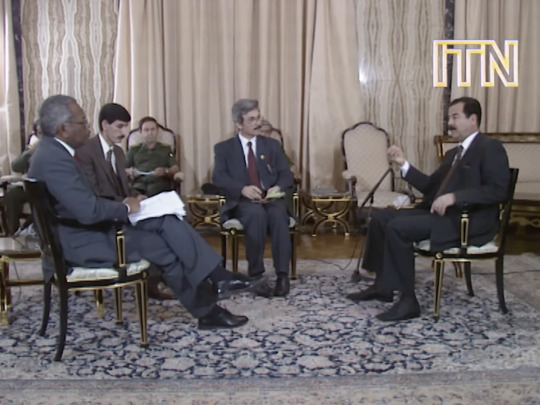
Contextualising Saddam Hussein's Regime:
Saddam Hussein, the former President of Iraq, undoubtedly presided over a regime marked by brutality, human rights abuses, and suppression of dissent. His invasion of Kuwait in 1990 and the subsequent Gulf War resulted in immense suffering for the Iraqi people. However, critics argue that the portrayal of Hussein as the epitome of evil may have been exaggerated for political reasons.
Influence of Political Motivations:
The execution of Saddam Hussein occurred amidst a tumultuous period in Iraq, marked by sectarian tensions and a fragile political landscape. Some critics believe that the decision to execute Hussein was influenced by a desire to establish a sense of closure and justice for the Iraqi people, as well as to send a message to other dictators in the region.
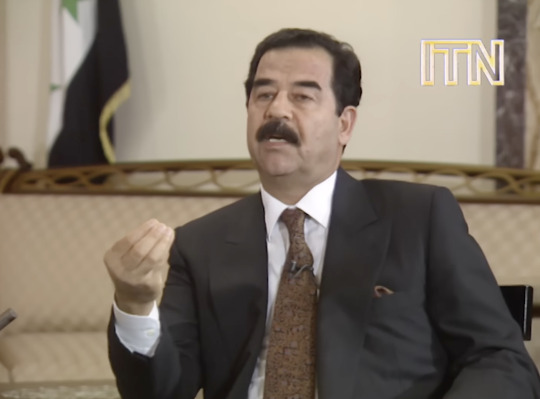
Flaws in the Judicial Process:
Detractors of Hussein's execution point to flaws in the judicial process, arguing that it lacked international legitimacy and transparency. They claim that the trial may have been politically motivated and that the rush to execute him did not allow for a thorough examination of the complexities surrounding his regime.
Exploring Alternatives to Execution:
Those who question the hanging of Saddam Hussein advocate for alternative forms of justice, such as a life sentence or an international tribunal. They argue that these options would allow for a more comprehensive examination of the crimes committed during his regime and promote a deeper understanding of the historical context.
Conclusion:
The debate surrounding the execution of Saddam Hussein remains highly controversial, with opinions sharply divided on whether he deserved the ultimate punishment or if alternative forms of justice could have been pursued. While acknowledging the atrocities committed during his rule, some argue that the rush to execution may have been influenced by political considerations, raising questions about the fairness and transparency of the judicial process. Ultimately, the execution of Saddam Hussein continues to be a subject of intense debate, prompting reflection on the complexities of justice in the aftermath of oppressive regimes.
#SaddamHussein#CapitalPunishment#Iraq#PoliticalJustice#HumanRightsAbuses#GulfWar#InternationalLaw#ControversialDecisions#WarCrimes#Dictatorship#JudicialProcess#HistoricalContext#GlobalDebates#EthicsOfExecution#SectarianTensions#MiddleEastPolitics#InternationalTribunal#Atrocities#RegimeChange#ExecutionDebate#today on tumblr
0 notes
Text
Russian Foreign Minister Criticizes Western Countries on Security Issues: A Call for Cooperation and Conflict Resolution
#aggression #armscontrol #armscontrolagreements #autonomy #belarus #communication #conflictresolution. #conflicts #cooperation #cyberthreats #decisionmakingprocess #dialogue #divisions #Donbasregion #internationallaw #memberstates #OrganizationforSecurityandCooperationinEuropeOSCE #participatingstates #RussianForeignMinisterSergeyLavrov #securityissues #sharedsecuritychallenges #tensions #terrorism #ukraineconflict #Westerncountries
#Politics#aggression#armscontrol#armscontrolagreements#autonomy#belarus#communication#conflictresolution.#conflicts#cooperation#cyberthreats#decisionmakingprocess#dialogue#divisions#Donbasregion#internationallaw#memberstates#OrganizationforSecurityandCooperationinEuropeOSCE#participatingstates#RussianForeignMinisterSergeyLavrov#securityissues#sharedsecuritychallenges#tensions#terrorism#ukraineconflict#Westerncountries
0 notes
Text
UK Pledges Unwavering Support for Ukraine at UN
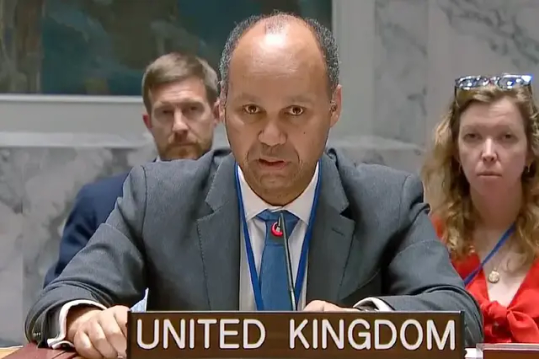
Speech Delivered at the UN Security Council in New York.
Word for Word transcript.
Thank you President, and I thank ASG Jenča for his briefing.
Colleagues, Russia has called this meeting in an attempt to distort history. Once again, the Russian delegation seeks to use this Council in a desperate effort to justify Russia’s unprovoked, unnecessary and illegal invasion of Ukraine.
The Russian Permanent Representative claimed that Putin’s war was necessary to prevent conflict and alleviate suffering in the Donbas. That it was Ukraine and its partners who were responsible for undermining the Minsk agreements.
Members of this Council know better. It was Russia’s aggression that killed the Minsk process. It was Putin who declared that the Minsk agreements no longer existed. And it was Russia that systematically failed to implement its obligations, freely signed up to, under the Minsk agreements, which the Council endorsed unanimously in resolution 2202.
Two years ago, we urged Russia in this chamber to act in the interests of peace and to give the Minsk agreements a chance.
The United Kingdom consistently called on all parties to implement their commitments under the Minsk agreements in full, right up until Putin signed a decree recognising Donetsk and Luhansk as so-called independent entities. Three days later, he invaded Ukraine.
Since then, millions of people across Luhansk, Donetsk and other temporarily Russian-controlled territories have suffered terribly because of Russia’s invasion. Russia’s actions have deprived them of humanitarian assistance, despite consistent calls by the General Assembly, that Russia allow humanitarians safe access to these areas.
President, the Russian Permanent Representative made various claims about the ICJ today. The courts found that Russia had violated international law in three ways. It discriminated against Ukrainians. It failed to investigate allegations of terrorist financing. It failed to comply with the court order not to aggravate the dispute with Ukraine. And of course, Russia has failed to comply with the provisional measures of March 2022 ordering Russia to leave Ukraine.
President, the truth is this war is entirely of Russia’s choosing. Putin’s decision to launch his illegal and barbaric invasion in February 2022 shows us clearly that he was never interested in peace.
We urge Russia once again to end its illegal invasion, withdraw from Ukraine and respect the principles of the UN Charter. Until then, the UK will continue to stand with Ukraine, to defend the Charter and to call out Russian disinformation.
Sources: THX News, Foreign, Commonwealth and Development Office & James Kariuki.
Read the full article
#AmbassadorJamesKariuki#Humanitarianassistance#illegalinvasionofUkraine#Internationallaw#Minskagreements#Russiandisinformation#sovereigntyandterritorialintegrity#UKsupportforUkraine#UNCharter#UNSecurityCouncil
0 notes